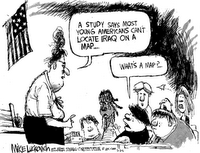
Education is a hot topic in India or elsewhere. India Today ran a story in issue dated Nov 27 2006 how bad our education is getting.
Here is Luckovich's take on school education in US. Being a Spartan, he also throws in "Iraq" to the cauldron to deliver a huge kick.
Look at the innocent expressions on the kid's face asking question.
Like all great art, you feel happy and sad. Don't you?
This is my take on the subject:
"Objective of our education system has now firmly become only money. Sure, money has always been an important objective but hardly the only objective which it now is. Our society at large too has started honoring riches a lot more than it did in the past. To paraphrase W H Auden, we went from being like Europeans ("No European associates wealth with personal merit or poverty with personal failure") into an embrace of USA (" the power to earn money as proof of one’s manhood").
And money comes easy today. There is so much demand created for English speaking youth by BPO, retail, banking and IT industry that you need to have a 'good' degree/diploma but not necessarily good education. Shiv Vishwanathan has summed it up for India Today special millennium issue “… Science today is a creature of market or state. It is seen as the IT of Azim Premji and Chandrababu Naidu without asking how cyberspace and justice can unite. But there is no sense of fun, no invitation to ask why the sky is blue, or why a top spins or why a boomerang moves the way it does. We need to go back to our inventive history and bring science back into the celebration called culture, to create a science as inventive as our music or dance, a science that celebrates 40,000 varieties of rice and ensures they do not become a monoculture of five to 10 species. Next time you read the M G K Menon or the Murli Manohar Joshis or some policy bureaucrat, remember the need for the Mushtaq Alis of science”
I have another worry. We worry only about technical areas of education. What about "soft" skills education?
Gandhiji, Vinoba Bhave विनोबा भावे and Sane Guruji साने गुरुजी, who were great teachers first and foremost, wanted us to focus on softer skills to build tolerant and healthy society. Society free of corruption and communal hatred. Society that is compassionate. Society free of dogma and superstition. Society that respects manual and intellectual work equally.
Their teachings should be the foundation of any education system we build to get higher Gross National Happiness along with just higher Gross National Product."
No comments:
Post a Comment